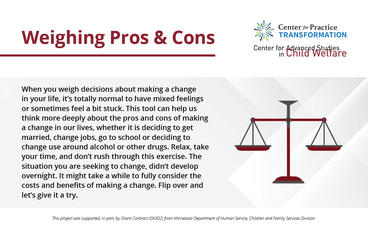Many child welfare workers would like to integrate person-centered practice into their work with children and families. See below for several tip handouts and practice tools created by the Center for Practice Transformation (CPT) in partnership with CASCW. Reach out to cascw@umn.edu for sample tools or a bulk order.
Downloadable tips and guides
Supporting Parents in their Recovery Journey
This hands-on workshop will walk the audience through using five very practical “meeting guides” (see download links above) for commonly experienced situations. Each guide provides professionals with skills and strategies to navigate challenging situations and offer parents and caregivers very practical ways to support and enhance their recovery.
The five topics include:
- Managing Stress in the Moment
- Asking for Help
- Managing Stress in the Body
- Problem Solving
- Dealing with High-risk Situation
Scaling Tool
The Scaling Tool is a discussion tool that offers a way to explore an individual’s experiences and ‘wants.’ These questions are conversation starters.
To use:
Ask client to pick a number on the scale that best reflects where they are.
Be sure to explore their responses more deeply with follow-up questions, i.e., “Why not a lower number?” Or, “What would it take to move this up from a 3 to a 4?“
- How important is this to you?
- How confident are you that you can accomplish this?
- How ready are you to take a step?
- How difficult do you think this will be?
- How much energy do you think this will take?
- How much support do you feel you will have in taking this step?
- How much support do you feel you will need to move forward?
Character Strength Cards
Character Strengths Cards can help workers to involve clients. Exploring and identifying a person’s unique strengths can inspire hope, strengthen engagement and help to build and support a working alliance. Each card represents a character strength. We have provided one example (Note: there are 16 cards available).
To use:
One way to use these cards is to engage a client in a ‘card sort.’ Here is how it works:
Hand all of the cards to your client. Ask them to sort the cards into three separate piles:
- Pile #1: Not like me.
- Pile #2: Somewhat like me.
- Pile #3: Very much like me.
From pile #3, have them select the 3 cards that they feel most represent their top strengths. Engage them in a conversation about what these strengths mean to them and how they have used them in the past. Have them consider how they can use them to address a current challenge, problem or barrier they may be experiencing.
If a person has trouble identifying strengths or sorting them into piles, you can ask if you can sort them according to the strengths you see in them.
Today Cards
Today Cards provide a variety of prompts intended for individual and group reflection. This product can serve as a tool to encourage discussion and meaningful learning in training, group, or supervision settings.
Worker Wellness Guide - Nurturing Resilience: Sustenance Amid the Suffering
Nurturing Resilience: Sustenance Amid the Suffering is for the benefit of the worker themselves. It includes tools for professionals to evaluate their own burnout, secondary traumatic stress and other related experiences as well as compassion satisfaction with validated tools and exercises. This tool is not intended to be used with clients, children or families.
Weighing Pros & Cons Resource Card

Weighing Pros and Cons This tool walks an individual through weighing decisions about making a change in one's life. This exercise can help us think more deeply about the pros and cons of making a change in our lives.